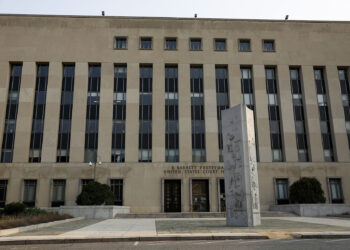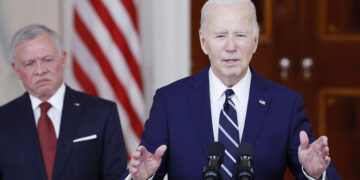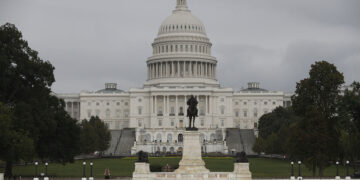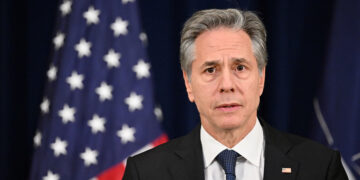Sarah Leah Whitson is the Executive Director of DAWN.
عربي
President Joe Biden, as expected, greeted Jordan's King Abdullah at the White House this week with effusive affirmations of support, calling him a "loyal and decent friend" in a "tough neighborhood." He promised that the United States, which gives the kingdom billions in military assistance, "will always be there for Jordan"—a message no doubt meant to squash any lingering doubts about the king's hold on power in Amman. Just months ago, an alleged coup plot against one of America's favorite Middle Eastern monarchs—reportedly hatched with the help of Saudi Arabia and Israel—was foiled, exposing rifts in Jordan's royal family.
But Biden's first meeting with an Arab leader in the White House ignored the questions that should really be asked: Why is the U.S. government persisting in propping up an unelected, authoritarian and quite unpopular monarchy, which is now the second-largest recipient of U.S. military and economic aid after Israel, and also massively expanding the U.S. military presence there? Who is really served, and who is harmed?
America's decades of support to the dictatorship that wears a crown in Jordan typically escapes scrutiny, drowned out by the far more grotesque abuses of America's two other top aid recipients: the Egyptian and Israeli governments. There are no mass killings of protesters, no mass bombardments of civilians, in the Hashemite Kingdom. There is, however, a monarchy that rules by diktat, masked by a toothless parliament and revolving door of prime ministers who have no actual authority where it matters—on the security and finances of the country. The monarchy maintains its grip via a powerful and pervasive internal security apparatus that often receives accolades from Western intelligence officials for their excellence in keeping Jordanians under tight control.
Jordanian officials can basically detain anyone they want, at any time, for as long as they want, relying on "administrative detention" powers in the eerily named "Crime Prevention Law" without any judicial process whatsoever. And detain them they do, with over 10,000 held in such administrative detention at any given time—a staggering statistic for a country of 10 million people. Among those detained have been thousands of women accused by their male guardians of disobedience, leaving the home without permission, or having sex outside of marriage. Sometimes, like with the imprisonment of the king's half-brother, Prince Hamzah bin Hussein, there's no attempt to cite any legal basis at all: King Abdullah has simply declared that he's holding the former crown prince, accused but never charged in April's apparent coup-plotting, at one of his palaces as a "family matter." How long he holds him, and in what conditions, is anyone's guess.
The litany of Jordanian government abuses of the rights of its citizens is abundant. Jordanians will be jailed if they criticize the government, if they protest, if they independently unionize, or if they strike. But like Morocco, Jordan passes as a soft autocracy, perpetually promising reforms to placate audiences at home and abroad, particularly when public resentment flares up into street protests—and perpetually failing to deliver any meaningful change to give Jordanians a real voice and control, including accountability, over their own government.
Washington doesn't care to look under the hood of this kingdom, because its only concern is ensuring a stable and servile monarchy that serves America's assumed and hoary assertions of regional interests, which are never questioned: billions annually to maintain Jordan's cold peace with Israel, and new and growing bases for U.S. troops, including weapons and personnel diverted from Qatar. Counterterrorism cooperation is also routinely cited as a critical aspect of the U.S.-Jordan relationship, with no scrutiny of its price tag. The U.S. and the monarchy signed a new security pact early this year, including a status of forces agreement that allows American soldiers to carry their weapons openly in the country. That provision was so distasteful and controversial to Jordanians that the king couldn't even get his rubber-stamp parliament's approval. So the king, of course, bypassed parliament and approved the agreement by royal decree in March. None of that seems to matter to Biden, who thanked King Abdullah at the White House for his "enduring and strategic relationship with the United States."
Hiccups in the relationship only emerge when the monarchy kicks back a bit against its bosses, such as its refusal to countenance any transfer of control over Muslim holy sites in Jerusalem, including the Al-Aqsa Mosque, to Saudi Arabia—which was apparently offered up by the Trump administration last year as a sweetener in a failed, last-minute bid to woo the Saudis into signing on the Abraham Accords to normalize relations with Israel. The purported Saudi-Israeli punishment for King Abdullah—reportedly collaborating with the coup plotters in Jordan this spring to remove him for his intransigence—was a step too far for the Biden administration, which has fallen over itself to reassure the king of its support. After making King Abdullah his first call to an Arab leader after his election, Biden has now given him the honor of being the first leader from the Middle East to visit the White House during his presidency.
But what about support for the Jordanian people? Will the Biden administration take responsibility for harming their interests and rights by aiding the monarchy's arsenal of repression? Let's be frank: The king does not legitimately represent the people of Jordan, and supporting him is at odds with supporting the people of Jordan. The U.S. must come to terms with that fact. And what of Biden's pledge to "revitalize" America's support for democracy and human rights around the world? How will he sell America and the "free world" as the preferred alternative to autocratic rivals in China and Russia, when the whole world can plainly see how his commitment to those stated values evaporates in Jordan and the rest of the Middle East?
Elsewhere in the region, the Biden administration has been wise to seek a new nuclear agreement with Iran, which will hopefully bring to an end over a decade of punitive sanctions against the Iranian people. Biden has also moved to end at least one of America's seemingly endless wars since 9/11, with the withdrawal of U.S. troops in Afghanistan. But his administration must go further and revisit so-called national security interests that demand unlimited political and military support for the Middle East's authoritarian, abusive and apartheid leaders. That aid implicates the U.S. in their oppression of the people they forcibly rule, and entangles America in their regional power contests, with questionable benefit to the American people.
![]()






































